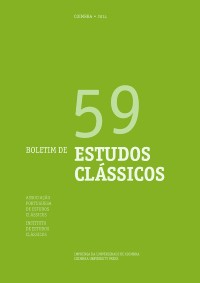Please use this identifier to cite or link to this item:
https://hdl.handle.net/10316.2/37532| DC Field | Value | Language |
|---|---|---|
| dc.contributor.author | Dias, Paula Barata | - |
| dc.date.accessioned | 2015-10-20T10:55:38Z | |
| dc.date.accessioned | 2020-09-21T05:30:47Z | - |
| dc.date.available | 2015-10-20T10:55:38Z | |
| dc.date.available | 2020-09-21T05:30:47Z | - |
| dc.date.issued | 2014 | - |
| dc.identifier.issn | 0872-2110 | - |
| dc.identifier.uri | https://hdl.handle.net/10316.2/37532 | - |
| dc.description.abstract | O tema da misoginia é um tópico literário frequente em toda a literatura latina, antiga e medieval. Apresenta‑se uma tradução portuguesa e um comentário literário do Poema alfabético De Mala Muliere, anónimo composto no século XIII, texto que desenvolve o assunto da misoginia recorrendo à antiga tópica anti‑feminina, renovada com os novos argumentos do cristianismo desenvolvidos de acordo com o contexto histórico da reforma gregoriana. | por |
| dc.description.abstract | The theme of misogyny is a frequent literary topic throughout ancient and Medieval Latin literature. It’s our aim to propose a Portuguese version and a literary review of the Alphabetical Poem De Mala Muliere, an anonymous thirteenth‑century text that develops the subject of female wickedness using not only the ancient anti‑female topics, but also new arguments of Christian thinking adapted to the historical context of the Gregorian reform in Western Europe. | eng |
| dc.language.iso | por | - |
| dc.publisher | Imprensa da Universidade de Coimbra | - |
| dc.rights | open access | - |
| dc.subject | Alphabetical Poem | eng |
| dc.subject | Misogyny | eng |
| dc.subject | Christianity | eng |
| dc.subject | Medieval Latin Literature | eng |
| dc.subject | Pope Gregory VII | eng |
| dc.subject | Poema Alfabético | por |
| dc.subject | Misoginia | por |
| dc.subject | Cristianismo | por |
| dc.subject | Literatura Latina Medieval | por |
| dc.subject | Papa Gregório VII | por |
| dc.title | La donna è mobile…: tradução e comentário do poema alfabético acerca da maldade deminina (Canticum alphabeticum de Mala Muliere, anónimo, século XIII) | por |
| dc.title.alternative | La donna è mobile...: portuguese version and commentary of the alphabetical poem about the wickedness of women (Canticum alphabeticum de Mala Muliere, anonym, XIII C.E.) | por |
| dc.type | article | - |
| uc.publication.collection | Boletim de Estudos Clássicos vol. 59 | - |
| uc.publication.firstPage | 105 | - |
| uc.publication.lastPage | 121 | - |
| uc.publication.location | Coimbra | - |
| uc.publication.journalTitle | Boletim de Estudos Clássicos | - |
| uc.publication.volume | 59 | por |
| dc.identifier.doi | 10.14195/0872-2110_59_8 | - |
| uc.publication.section | Latim medieval | - |
| uc.publication.orderno | 10 | - |
| uc.publication.area | Artes e Humanidades | - |
| uc.publication.manifest | https://dl.uc.pt/json/iiif/10316.2/37532/229045/manifest?manifest=/json/iiif/10316.2/37532/229045/manifest | - |
| uc.publication.thumbnail | https://dl.uc.pt/retrieve/11435600 | - |
| item.grantfulltext | open | - |
| item.fulltext | With Fulltext | - |
| Appears in Collections: | Boletim de Estudos Clássicos | |
Files in This Item:
| File | Description | Size | Format | |
|---|---|---|---|---|
| la_donna_e_mobile.pdf | 282.8 kB | Adobe PDF |  |
Items in DSpace are protected by copyright, with all rights reserved, unless otherwise indicated.
